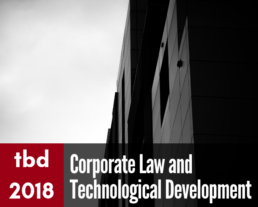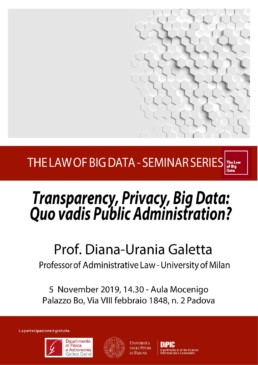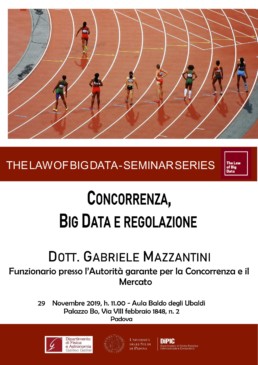The Digital Economy and the Law
The Digital Economy and the Law
Introductory Speech: Legal Challengesof Digitalization Prof. Claudia Sandei, UNIPD
The disruptive effect of digital technology on Contract Law Prof. Christian Twigg-Flesner, University of Warwick(UK)
The Digital Future of Corporate Law Prof. Florian Möslein, Philipps-UniversitätMarburg(DE)
Asian and Global Trends in Information Technology Law Prof. ShiChen, SWUFE Law School (China)
The seminar will be the 17 June, 16.00 in aula Nievo (in Palazzo Bo – Law Dept., University of Padova)
Main Speaker: Florian Möslein .
Florian Möslein is Professor of Law at the Philipps-University Marburg, where he teaches Contract Law, Company Law and Capital Markets Law. He previously held positions as Professor at the University of Bremen and as Associate Professor at the University of St. Gallen. Born in 1971 in Germany, Florian Möslein graduated from the Faculty of Law of the Ludwig-Maximilians-University of Munich in 1998, after having received the degree “licence en droit” at the University of Paris in 1996. He has also studied business administration and graduated in 1997 with the degree “Diplom-Kaufmann”. Moreover, Florian Möslein holds an LL.M. in International Business Law from the University of London (1999) and a doctorate from the University of Hamburg (2007); he also qualified as a practitioner under German Law (2001, Zweites Staatsexamen).
Codirector of the Institut für das Recht der Digitalisierung (Marburg) and Member of the ELI Digital Law SIG.

Transparency, Privacy, Big Data: Quo vadis Public Administration?
Transparency, Privacy, Big Data: Quo vadis Public Administration?
When: 5 November 2019, 14.30
Where: Aula Mocenigo Palazzo Bo, Via VIII febbraio 1848, n. 2 Padova
Abstract: In 2006 the Italian Government adopted a Legislative Decree (No. 36/2006) to transpose Directive 2003/98/EC on the re-use of public sector information.
The Directive was the first step of transparency and digitalization policies, which went beyond the aims of the Directive.
Italy adopted therefor two important legislative decrees (in 2009 and 2013) to realize the principle of transparency in our national legal and administrative system. This is pursued through the publication of a countless series of acts and information on institutional websites.
This concept of transparency raises two important issues. First, transparency is with no doubt fundamental for modern democracies, but has to be balanced with other values such as privacy and data protection. Second: increase the accountability of the Public Administration transparency policies could not reduce to mere open
data policy.
Prof. Diana-Urania Galetta
Full professor of Administrative Law and European Administrative Law at the Law Faculty of the University of Milan, where she former taught Administrative Law as an Associate professor. She studied Law and Political Science Law at the University of Milan (both Degrees cum laude). She studied also at the German University of Osnabrück (“Magistra Legum” degree cum laude).
She is Member of the Italian association of Administrative Law Professors (AIPDA), of the German Association of Public Law Professors (VDStRL), of the Societas Juris Publici Europei (SIPE). She is Member of the Steering Committee and Team Leader of WG 4 of the international research group “Network on European Administrative
Procedural Law” (ReNEUAL). She is Member of the Steering Committee of the Franco-German doctoral school on “Legal comparison in Public law in the light of European integration”.
She is Member of the Steering Committee of the “School of Journalism Walter Tobagi”, organized by the Italian Council of the Journalists in agreement with the University of Milan. She participates in the activities of several international research groups: the Dornburg Study Group on the Transformation of Administrative Law in Europe, the international research group Projeto euro-americano “Còdigo modelo de jurisdição administrativa” etc. She is Member of the Steering Committee of the “Rivista italiana di Diritto pubblico comunitario” (Italian Journal of Public EU Law) and of the Committee of Referees for several Law Journals: Diritto, immigrazione e cittadinanza; European Public Law; Foro amministrativo; IUS PUBLICUM Network Review.

CONCORRENZA, BIG DATA E REGOLAZIONE
CONCORRENZA, BIG DATA E REGOLAZIONE
Incontro con Gabriele Mazzantini per illustrare quali tematiche fondamentali emergano nella pratica dell’Autorità alla luce dei Big Data
Dove e quando: 29 novembre, alle 11;00, in Sala Baldo degli Ubaldi.
ATTENZIONE: A causa dell’inagibilità della sala Baldo, ci raduneremo presso la Sala Lettura presso il Seminario di Diritto Tributario.
Gabriele Mazzantini ha studiato Economia e commercio presso l’Università degli studi di Firenze, ove ha poi conseguito il titolo di dottore di ricerca in Economia e gestione delle imprese e dei sistemi locali. In seguito ha conseguito Master in Management e Politiche delle Pubbliche Amministrazioni presso la Luiss.
Dopo aver lavorato presso l’Istituto Regionale per la Programmazione Economica della Toscana, è stato funzionario presso l’Autorità Garante della Concorrenza e del Mercato, prima impiegandosi presso l’Ufficio di Gabinetto dell’Autorità, poi presso l’Ufficio del Segretario Generale, infine presso il Comitato per le Valutazioni Economiche. Per cinque anni è stato capo segreteria e assistente di un giudice della Corte costituzionale. Da novembre 2016 lavora come funzionario presso la Direzioni Studi e Analisi della Legislazione dell’Autorità Garante della Concorrenza e del Mercato. Collabora inoltre con l’Osservatorio sulle esternalizzazioni e con l’Osservatorio sull’AIR, istituiti presso l’Istituto di Ricerche sulla Pubblica Amministrazione.
Ha al suo attivo diverse pubblicazioni in tema di concorrenza, di regolazione dei mercati e di servizi pubblici.

The Law of Big Data Workshop
The Law of Big Data Workshop
As the conclusion of this year project, we will organize an Interdisciplinary Workshop in order to discuss what we have learned from the Law of Big Data seminar cycles and which future perspectives and collaborations the project developed and open. We will also launch the new and related project: AI, Innovation and Society.

